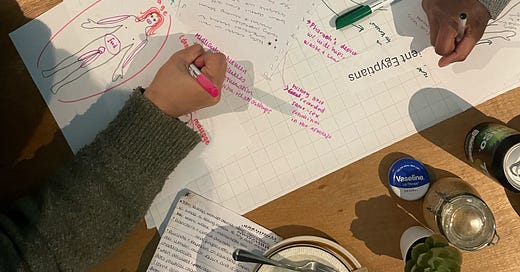My Letter to Bonnie Blue and Lily Philips
As a Sexuality Educator, a Psychosexologist, but mostly, as a Woman.
Dear Bonnie and Lily,
As women, feminists, and human beings, we owe it to one another to reflect deeply on the impact our actions and online presence have on society. In a world where our choices and successes can be ever more easily publicized, we must take accountability for the messages we share.
The ignorant concept of choice feminism—that ultimate freedom and equality come from unrestricted individual choices—fails to acknowledge the broader harm these choices can inflict. Your promotion of infidelity, disregarding protection against STIs, and perpetuating harmful stereotypes about women’s sexual desires contribute to a culture that normalizes the mistreatment of women. This isn’t just a theoretical risk; it’s real harm. Husbands are encouraged to visit sex workers without protection, women are coerced into acts they don’t consent to and that don’t bring them pleasure, and STIs are being transferred into relationships. The idea that women inherently want less sex than men stems from a society where women are denied the opportunity to enjoy sex that is pleasurable for them. The penetration-centric sex you glorify often excludes women’s needs, leaving them pressured to consent out of fear their partners will leave for someone else. Rather than amplifying this pressure, your platform could be used to encourage healthy conversations between partners and sex workers—discussions about mutual pleasure, boundaries, and how elements like pornography or sex work could be incorporated consensually and safely into relationships.
If you truly believed in creating a sex-positive porn industry and society as you say you do, I belive that you would be concerned regarding the messages you share. Sex-positivity, which I strongly advocate for, is about creating a healthier, more equitable sexual culture. It’s about eliminating shame and judgment around gender, bodies, and sexuality while emphasizing personal pleasure and informed consent. Historically, women who embraced their sexuality faced punishment and ostracism. Today, we have an opportunity to move past those biases. However, the content you create does not align with these principles. Instead of empowering people to pursue authentic desires, you reinforce societal expectations and pornographic standards. This is not liberation; it’s a rebranding of old, harmful norms.
If your mission is truly to change the narrative around sex work, it must start with consistency in your messaging. Referring to full-service sex workers as “prostitutes,” as Lily did in the horrificually vulberable video of her after having ‘sex’ with 100 men, undermines the dignity and rights of those you claim to support. This language creates a harmful hierarchy where certain types of sex work are deemed “respectable” while others are not. Advocacy for sex workers cannot be selective—it must embrace all, regardless of age, appearance, or platform.
I understand that controversy pays the bills and clickbate is key for creators. But with your platform comes responsibility. Many of your followers lack the critical thinking skills to question your content and are instead absorbing harmful messages as truth. Whether you acknowledge it or not, you are educators to your audience, particularly to young, impressionable viewers. Your choices shape not only their understanding of sex but also the societal norms they perpetuate.
As a sex educator, I see the fallout from this misinformation daily. We work tirelessly to help young people unlearn the distorted messages they encounter online and guide them toward a healthier understanding of sex, pleasure, and boundaries. It’s an uphill battle when controversial creators like yourselves dominate their feeds. You may not have intended to take on the role of sex educators, but your influence makes you part of young people’s learning. I urge you to ask yourselves: are you using this power responsibly?
One of the most disturbing accounts I have heard is that you ‘prioritized men with an STI test check’ but then did not use condoms when engaging in oral sex. Do you not know or do you just not want to talk about the fact some STIs cannot be detected for months after first contracted, but can still be spread orally and otherwise?
If we want a future where sex is safe, consensual, and pleasurable for everyone, it starts with education—both formal and informal. We need a society where consent is deeply understood, contraception is normalized and accessible, and individuals are empowered to prioritize their health and pleasure. Instead, your content normalizes risky behaviors, overlooks vital information about STI transmission, and reinforces unrealistic sexual standards.
Now I do not in any way think that sexuality education should fall on to your shoulders. that is not your responsibility. Schools, families, and governments should be spending more time, money, and resources into ensuring their young people have the sufficient skills to be able to navigate their sexual worlds healthily - and that includes being able to critically think about the content they see on social media. But I think you are profiting of the current gap in our education system and taboo society in order to capitalize of vulnerable and screen addicted young people without considering the wider consequences for their futures.
I plead with you to reflect on the content you create. Do you genuinely believe it contributes to a safer, healthier, and more informed sexual culture? Or is it profiting off a lack of education, vulnerabilities, and hyper-sexualisation of women? I so desperately do not want to see a generation of girls who feel pressured to perform to the same standards as what they are hearing from content creators like yourselves. If you care about the sexual wellbeing of yourselves, your followers, and your fans, I urge you to use your platform to help foster a generation that knows their boundaries, understands pleasure, and prioritizes their health and safety.
The future of sex-positivity and women’s rights depends on it.
Sincerely,
Sarah



